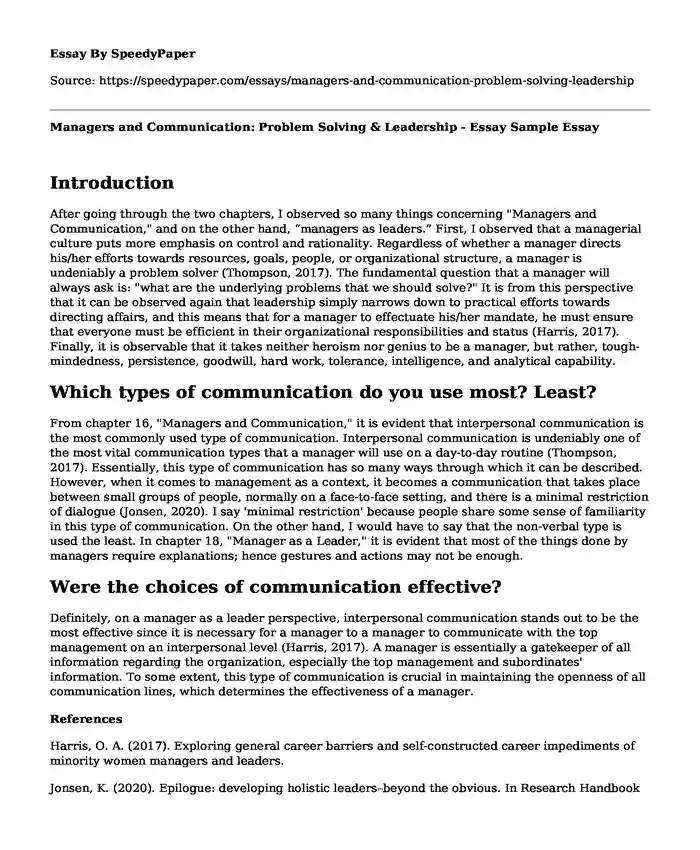
| Type of paper: | Essay |
| Categories: | Leadership analysis Management Communication |
| Pages: | 2 |
| Wordcount: | 464 words |
Introduction
After going through the two chapters, I observed so many things concerning "Managers and Communication," and on the other hand, “managers as leaders.” First, I observed that a managerial culture puts more emphasis on control and rationality. Regardless of whether a manager directs his/her efforts towards resources, goals, people, or organizational structure, a manager is undeniably a problem solver (Thompson, 2017). The fundamental question that a manager will always ask is: "what are the underlying problems that we should solve?" It is from this perspective that it can be observed again that leadership simply narrows down to practical efforts towards directing affairs, and this means that for a manager to effectuate his/her mandate, he must ensure that everyone must be efficient in their organizational responsibilities and status (Harris, 2017). Finally, it is observable that it takes neither heroism nor genius to be a manager, but rather, tough-mindedness, persistence, goodwill, hard work, tolerance, intelligence, and analytical capability.
Which types of communication do you use most? Least?
From chapter 16, "Managers and Communication," it is evident that interpersonal communication is the most commonly used type of communication. Interpersonal communication is undeniably one of the most vital communication types that a manager will use on a day-to-day routine (Thompson, 2017). Essentially, this type of communication has so many ways through which it can be described. However, when it comes to management as a context, it becomes a communication that takes place between small groups of people, normally on a face-to-face setting, and there is a minimal restriction of dialogue (Jonsen, 2020). I say 'minimal restriction' because people share some sense of familiarity in this type of communication. On the other hand, I would have to say that the non-verbal type is used the least. In chapter 18, "Manager as a Leader," it is evident that most of the things done by managers require explanations; hence gestures and actions may not be enough.
Were the choices of communication effective?
Definitely, on a manager as a leader perspective, interpersonal communication stands out to be the most effective since it is necessary for a manager to a manager to communicate with the top management on an interpersonal level (Harris, 2017). A manager is essentially a gatekeeper of all information regarding the organization, especially the top management and subordinates' information. To some extent, this type of communication is crucial in maintaining the openness of all communication lines, which determines the effectiveness of a manager.
References
Harris, O. A. (2017). Exploring general career barriers and self-constructed career impediments of minority women managers and leaders.
Jonsen, K. (2020). Epilogue: developing holistic leaders–beyond the obvious. In Research Handbook of Global Leadership. Edward Elgar Publishing.
Thompson, B. (2017). Researching Women Managers and Leaders. In Gender, Management, and Leadership in Initial Teacher Education (pp. 125-162). London: Palgrave Macmillan.
Cite this page
Managers and Communication: Problem Solving & Leadership - Essay Sample. (2023, Nov 30). Retrieved from https://speedypaper.com/essays/managers-and-communication-problem-solving-leadership
Request Removal
If you are the original author of this essay and no longer wish to have it published on the SpeedyPaper website, please click below to request its removal:
- Alone Together by Sherry Turkle - Book Review Essay Example
- Essay Sample: Bank of America Versus Sundquist
- Paper Example. Fannie Lou Hamer
- Essay Sample on Application of Lao-Tzu's Concept in Real Life
- Free Essay: Relationship Analysis Paper
- Free Essay: The Criticality of Operational Business Decisions Made Within the Game
- Free Essay Example:The Use of Technology in Supply Chain Management
Popular categories




